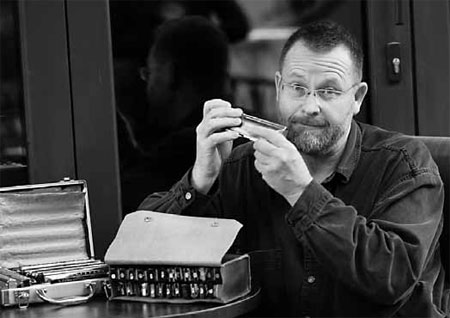Harmonic convergence, with his lips
Updated: 2013-02-24 08:30
By Chen Yingqun(China Daily)
|
|||||||
|
Brendan Power says a harmonica can be expressive in traditional Chinese music. Zou Hong / China Daily |
It is the kind of music you are likely to hear as you watch the sheriff's posse settle in for the night, warmed by the glowing embers of a campfire.
The harmonica is as much a part of American Westerns as howling coyotes, cicadas and Colt 45 revolvers. But the world-renowned harmonica player Brendan Power is so versatile with the instrument that he can transform it to play music that would not be out of place as the soundtrack to a costume drama set in ancient China.
That is exactly what Power, 56, did in Beijing recently when he gave an exquisite rendering of Jasmine, a well-known Chinese folk song, on his Western harmonica.
"This is awesome," said Xu Guangyu, 22, a harmonica lover who had traveled from Henan province in Central China to meet Power.
Power, whose music can be heard in Hollywood movies such as 2008's film Atonement which won an Academy Award for best soundtrack, toured China and gave a lecture in a Beijing blues club that was packed with fans who bombarded him with questions.
Jasmine, whose rendition particularly impressed the audiences that afternoon, is just one song on Power's latest album, New Chinese Harmonica. On it he plays nine well-known Chinese folk songs that were originally played on Chinese folk-music instruments such as the erhu, a string instrument, and the hulusi, a traditional Chinese free-reed wind instrument.
"This is my attempt to show Chinese people that the harmonica can actually be just as expressive for Chinese music as traditional instruments," he says.
Power, a New Zealander who has lived in Britain for 20 years, says the harmonica was invented in China about 2,000 years ago and is the basis for the modern harmonica that was developed by a German.
"The free reed that makes the sound in harmonicas is thousands of years old, first documented in ancient Chinese literature," he says.
However, the tremolo harmonica that many Chinese people owned as children is widely considered a toy and unsuitable for public performances because of its limited range. The modern harmonica played in the West is usually chromatic or diatonic, offering a greater sound range. That makes playing Chinese music on the harmonica even more pertinent, Power says.
"It's like bringing the harmonica back to China, completing a circle," he says.
Power has long been fascinated by China. Drawn to Chinese Taoism, he wrote a thesis on the ancient Chinese Taoist philosopher Chuang Tzu when he was at college many years ago.
He has released 15 solo CDs, in a wide variety of musical genres such as jazz, pop and blues. He is also an expert player of Irish traditional music. In 1993 he won the "All-Ireland Title", and more recently the Society for the Preservation and Advancement of the Harmonica in the US named him international player of 2011-12.
Power says his long fascination with China has included its traditional music.
"I love it; it's a passion for me. I mean I just love hearing the expression; the scales are often very simple scales, but the motion and expression of the Chinese traditional musicians gets out of the simple scales. I think is amazing."
He says his desire to play Chinese music was inspired by a video of a well-known erhu player, Min Huifen, playing the piece Moon Reflected on Er'quan Spring on YouTube two years ago. "I was just blown away by her expressiveness and her passion, and I love the big bending notes, so I wondered if I could do it on the harmonica. Then I studied it and I changed the harmonica to suit it."
chenyingqun@chinadaily.com.cn
(China Daily 02/24/2013 page5)
